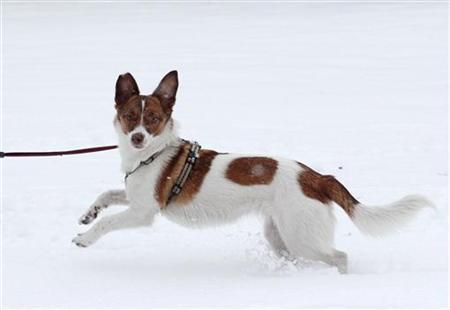日本一位科学家研究发现,狗之所以能够光脚在雪地上行走自如,而不觉得冷,奥秘之处在于其脚掌上有个内部中央供暖系统,它能让温暖血液流到特定部位,以避免冰冷的地面导致身体受寒。这套机制是利用温暖的含氧血液,将接触到冰冷地面的冷血液加温,然后送回心脏和中央循环系统。在狗的腿部,动脉和脚掌肉垫的静脉十分靠近,从心脏携带到动脉的血流能够轻易将温热传导到温度较低的静脉血管。这种热传导机制让脚掌垫即使暴露在极低温下,也得以保持恒温状态。

|
 |
|
A dog runs through the snow during snowfall in Vienna, January 17, 2012. |
Ever wonder how dogs can walk barefoot in the snow? Now a Japanese scientist may have the answer -- an internal central heating system.
The secret lies in how dogs circulate their blood to prevent cold surfaces from chilling the rest of their bodies, according to Hiroyoshi Ninomiya, a professor at Yamazaki Gakuen University, just west of Tokyo.
The system uses warm, oxygenated blood to heat the cold blood that has been in contact with a cold surface before returning it to the dog's heart and central circulation.
"Dogs exchange heat at the end of their legs. Arterial blood flows to the end of their legs and then heats up venous blood before returning it to the heart," Ninomiya said of his findings, published in the journal Veterinary Dermatology.
"In other words, they have a heat exchange system in their feet."
Ninomiya studied a preserved dog's leg under an electron microscope and found that because of the proximity of arteries and veins in the foot pad, the heat in the blood carried from the heart to the arteries is easily conducted to the cooler blood in the veins.
This heat transference maintains a constant temperature in the foot pad, even when exposed to extremely cold conditions.
Dogs are not alone in having this sort of heat exchange system, which is shared by other animals such as dolphins, Ninomiya said.
But not all dogs thrive in the cold, due to refining by breeders seeking specific traits, he added.
"Dogs evolved from wolves, and so they still have some of that ancestry remaining," he said.
"But that doesn't mean that one should always go and drag around in the snow all the time. There are many varieties of dogs nowadays that are not able to stand the cold."
相关阅读
(Agencies)

(英语点津 Rosy 编辑)